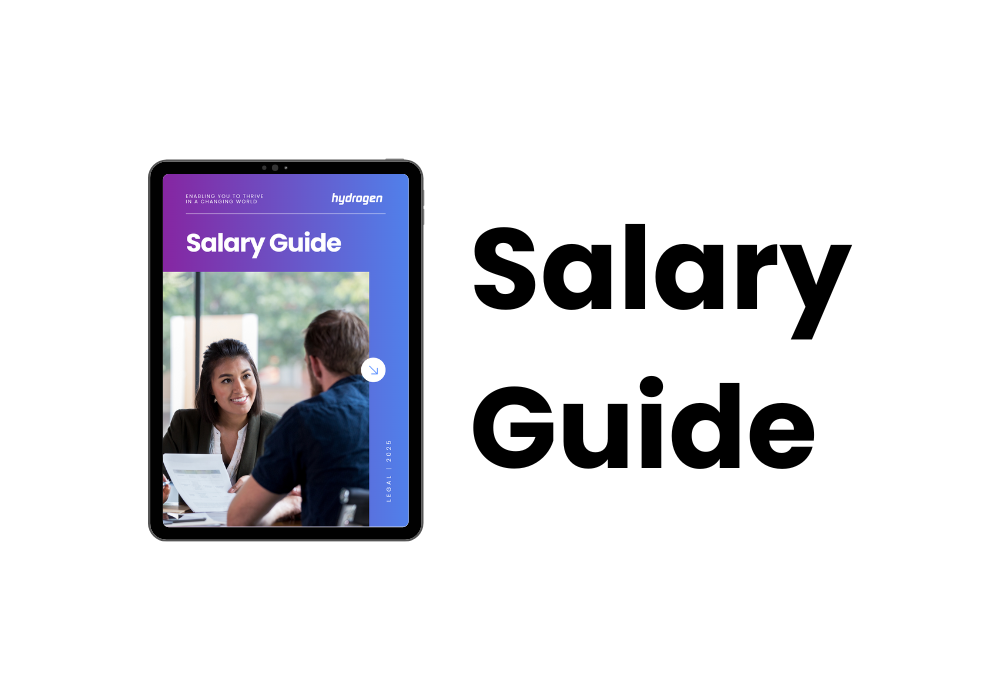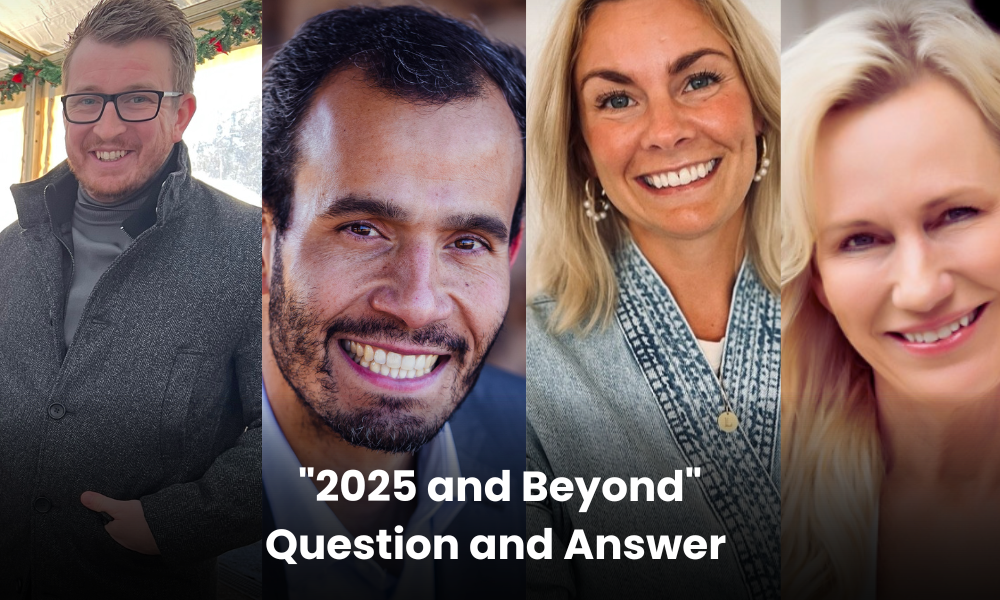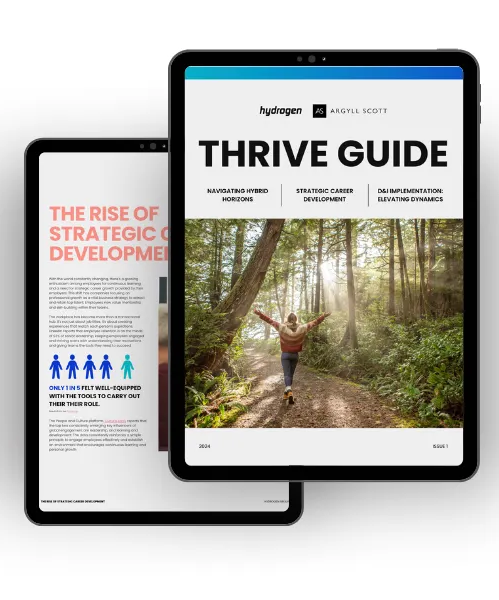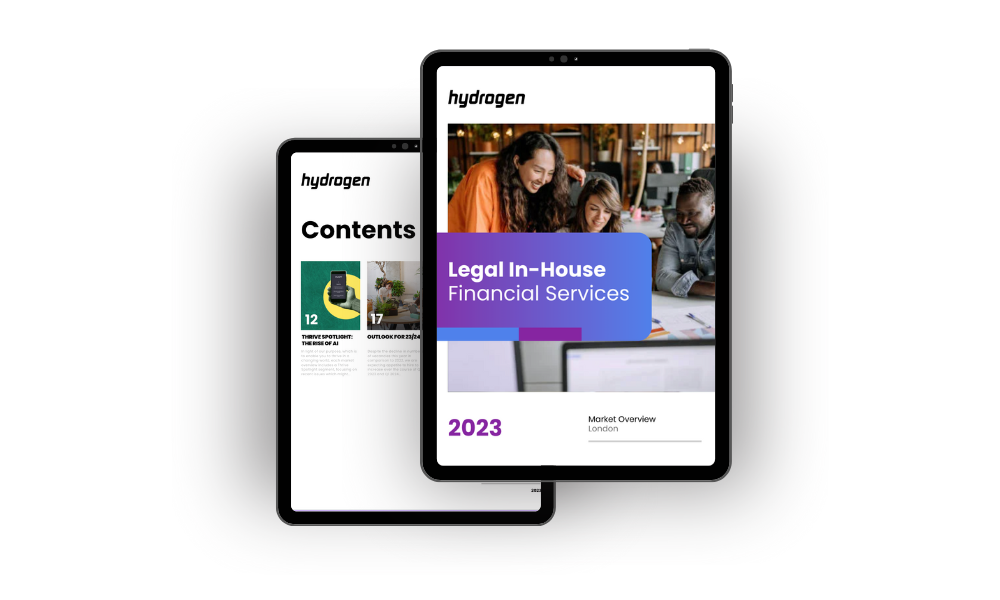Our expert views
Find out about the latest news and events from Hydrogen and browse through our blogs.
Our latest insights

Seven million clean energy skilled workers missing by 2030. Will your projects survive the shortage?
Seven million skilled workers missing by 2030. Will your projects survive the shortage?

With over 20 years of experience in the global legal arena, we've provided our clients with access to top legal talent worldwide. Leveraging our extensive industry connections and in-depth expertise, we've curated the most comprehensive salary data and hiring trends for professionals like yourself. Our 2025 Salary Guide provides an overview of competitive packages and explores the latest hiring trends shaping the landscape of Legal employment in your region. Get your complimentary copy of the 2025 Salary Guide directly to your inbox by filling in the form below.

We're back! We're thrilled to announce the return of our interview series, Women in Law, where we shine a spotlight on the extraordinary women making waves in the legal world. Join us as we delve into their journeys, explore their challenges and triumphs and celebrate their remarkable achievements. Anna is a partner in the Herbert Smith Freehills LLP corporate practice in Dubai specializing in mergers & acquisitions, joint ventures and investments with particular focus on the Middle East. Anna is regularly involved in award winning and other high-profile transactions in the region that span a number of sectors. In addition to executing transactions in the energy and infrastructure sectors, Anna advises on digital infrastructure and TMT transactions. Anna studied law and obtained her master's in law from the University of Warsaw in 2005 and subsequently moved to the UK to pursue her career in law in London. She re-qualified as a solicitor in England and Wales in 2013. She spent over 13 years working for two US law firms in the City of London before moving to Dubai and joining Herbert Smith Freehills in 2018 as a senior associate. Anna was first promoted to of Counsel in 2023 and elevated to partner in May 2024. Anna is frequently commanded by her clients for her exceptionally pragmatic approach to transactions, enabling them to navigate complex legal challenges with ease. Why did you decide to pursue a career in law? I didn’t always know I wanted to be a lawyer. In fact, I considered other paths. At one point at a very young age, I even thought about joining the army – I admired the discipline and resilience it required, and honestly, some of those skills would be helpful in law, too! While I had considered pursuing an MBA immediately after completing my master's degree, I ultimately chose to move countries and requalify in the UK, believing that this path would provide me with the most meaningful opportunities to advance my career. Looking back on your career, what are some key moments that have helped or hindered you in getting to where you are? There have been many key moments, both positive and challenging, that have shaped where I am today. Early on, studying law in two different languages and legal systems and requalifying in a very competitive market in London was a significant hurdle and achievement, that taught me the value of determination, hard work and persistence. Ultimately, moving firms to prove myself further and eventually relocating to Dubai to accelerate my career were key decisions that allowed me to challenge myself in new ways and grow. On the flip side, there were times when I faced doubts about whether I belonged in certain rooms, especially being a woman in a traditionally male-dominated industry. But each obstacle has made me more determined and shaped my leadership style. Each of these steps has been part of my evolution, and over the years I have learned that resilience and adaptability are key to navigating any obstacle. My promotion to of Counsel and then Partner earlier this year were major milestones, and currently, I am the only female partner in the office, which is something I am incredibly proud of. Having said all that, I know I wouldn't have been able to achieve all this without the support of amazing colleagues and mentors along the way. Do you believe there’s a glass ceiling for women in the workplace, and has it changed? I do believe the glass ceiling still exists in many industries, including law, though progress is being made. I have experienced certain challenges in my career, but I have not faced prejudice based on my gender; I’ve always thought of myself simply as a lawyer, focusing on being the best I can be. Today, we’re seeing more women in leadership roles, and I am proud to be among them. Yet, women still encounter less visible challenges, whether in the form of bias, societal expectations, or balancing family life with a demanding career. While strides have been made, there’s more to be done. Through evolving recruitment practices, mentorship, diversity initiatives, and challenging outdated norms, we can create further change. I’m encouraged by the support women offer each other, and that keeps me hopeful that the glass ceiling will continue to crack. What do you think the legal industry can do to improve diversity & inclusion? The legal industry has made progress, but there’s still room for improvement. First and foremost, we need more than just diversity in numbers—we need inclusion at every level, where everyone’s voice is heard and valued. This can be achieved through better representation in leadership positions and by ensuring that recruitment practices are truly inclusive. Broaden recruitment criteria to include candidates with diverse life and career experiences will create a more inclusive environment and enrich teams with new perspectives. Mentorship and sponsorship programs for underrepresented groups can make a huge difference in retaining diverse talent. The industry also needs to focus on creating a supportive environment where people can bring their authentic selves to work without fear of judgment. As part of my new role, I make it a priority to champion diversity and inclusion, and I encourage others to do the same. What advice do you have for young women looking to make a career in your industry now? My advice to those starting their legal careers is that hard work is essential, but in today’s world, it’s also crucial to be resilient, proactive and open-minded. The legal world is evolving, so it’s crucial to stay alert to change and seek out opportunities, even if they’re outside your comfort zone. Your career may not be a straight line, it may have twists and turns, but each step, whether a success or a setback, adds to your growth. The most successful lawyers are often the ones who are authentic and have taken unique paths to get where they are. Success is as much about resilience and adaptability as it is about effort. Focus on building core skills and surround yourself with a network that supports and challenges you. And, most importantly, stay true to your values and who you are.

Innovation thrives on diverse perspectives. Yet, women still hold only 27% of STEM (Science, Technology, Engineering and Mathematics) jobs , despite them making up nearly half of the workforce. That’s a massive gap, and if your business isn't working to close it, you're missing out on untapped potential, fresh ideas and a stronger competitive edge. But don’t worry – we’re here to help! We’ve been catching up with inspiring women in the STEM and diversity and inclusion space, asking them that one question the STEM industry has grappled with since its foundation – what can businesses be doing to attract more females into the sector? So here it is, a guide for women in STEM – by women in women in STEM. Sure, we’ve come a long way (back in 1970, only 8% of STEM roles were held by women), but progress has slowed, and serious challenges remain. Women in STEM earn only 74% of what men in similar roles do, and many face roadblocks like pay gaps, fewer leadership opportunities and unconscious bias. As progress in closing the gender gap has slowed, businesses must take decisive action to attract and retain more women in STEM roles to foster a more inclusive and innovative environment. It’s time for businesses to step up. So, without further ado, here’s what women in STEM say are vital for attracting more females to the industry: 1. “Implement female mentors” Attracting female talent is only half the battle - keeping them engaged and helping them grow is just as important. Racing TV Sports Presenter and Women in Tech advocate, Sophie Brown, says, “I would encourage businesses to implement mentors, but also encourage women to find external mentors too. While an internal mentor can give you confidence and leadership skills, there is serious value in having an external mentor, giving you more freedom to explore advice with zero bias ” . “More female mentors in the STEM space means creating a warmer and more welcoming environment for women entering the industry. I had to go out and find mentors for myself when I first started out, but now there are incredible mentorship programmes available to businesses”. Sophie is also known for her appearance on the Channel 4 show, Married at First Sight , where she stood up to body shaming contestants and spoke out about the misogynistic side of fame. “As females in the industry, we need to speak up more about our experiences and anecdotes,” Sophie says. “More visibility of inspiring women in STEM will encourage others to take the leap and explore.” It’s clear that implementing mentorship programs for women is essential for businesses to give females a voice, support their career growth, and foster a more inclusive and innovative workforce. Businesses should also work harder to highlight the success of female colleagues to inspire others into the industry. 2. “Rethink your culture” Justine Craston, former Diversity, Equity and Inclusion Practitioner at Dojo , says her number one piece of advice to businesses is to, “be VERY intentional about how you are driving ‘Inclusion’ in your Diversity, Equity and Inclusion practices ” . Building a more inclusive workplace in the Science, Technology, Engineering and Mathematics sector doesn’t happen by accident. It takes active work. Justine maintains this starts by curating a culture of psychological safety. “Be curious”, Justine says. “It’s much better to ask about an employee’s experience than to avoid the subject… It never hurts to give someone the opportunity to be listened to”. Businesses that actively support diverse voices will attract, retain and inspire female talent. Justine also suggests working with Employee Resource Groups (ERGs) to “drive belonging and inclusion”, as well as being a great platform to connect and share experiences. 3. “Redesign ‘flexibility’ and parental benefits” Biased hiring processes often unintentionally deter women. Flexible work options like remote roles or flexible hours can make a big difference for women balancing career and family. Joan Iwuoha, Product Manager at HNG Tech , says, “Mothers in STEM are constantly juggling work alongside family. To accommodate them, businesses should have options like flexible work hours and remote work ”. Companies including Next , Morgan Stanley and Toyota even have on-site nurseries charging competitive rates, some via a salary sacrifice scheme. This work benefit is currently extremely rare, despite 71% of working mothers having children under 4. Joan says that on-site childcare “takes away the stress from mothers in STEM and will encourage more females who plan to have a family into STEM roles ” . 4. “Build a clear pathway for growth and leadership” Women are more likely to pursue STEM careers if they can see themselves succeeding. Promoting and celebrating female leaders - both inside and outside your company - creates visible proof that the future of STEM is diverse. Former Client Operations Manager in the SaaS world, Luciana Alemanno-Frankson, says, “Many women look for opportunities where they see a strong possibility of progression, mentorship and leadership development. It’s not just about hiring more women, but ensuring they have the tools and support to thrive and grow within the organisatio n” . Authentic role models are bound to inspire current employees and the next generation of female innovators. Luciana says on the topic, “Providing access to female role models in senior positions and ensuring diverse voices are actively included in decision making can be a strong draw for women considering a career in STEM ” . By creating an environment where growth and leadership are accessible, companies can create a lasting impact, empowering women to envision and achieve long-term success in STEM fields 5. “Close the pay gap” Women in STEM make around $66,200 annually compared to men’s $90,000 in the US, and in the UK, on average, females in STEM earn around 19% (or £12,000) less than men. Presenter, Sophie Brown, says on the subject, "For businesses, transparency from senior leadership is important so that everyone knows where they stand, and more conversations around salary negotiations and instilling confidence need to be had. To female candidates – know your worth and schedule in a pay review as soon as you accept the role to make sure it’s solidified in. Your salary is your livelihood – it should never be underestimated!” Empowering women to advocate for their worth begins with a culture of transparency and support. When businesses actively promote equal pay opportunities and encourage open conversations about compensation, they create an environment where every woman feels valued and confident in asking for what she deserves. 6. “Inspire future generations” “It’s our responsibility to engage Gen Z and Gen Alpha by showcasing pathways to fulfilling STEM careers ” , says female Director at an IT talent solutions firm. “We need to create workplaces that align with their values, making STEM roles more attractive and relevant to their priorities.” If businesses want more women in STEM, they should start at the source. Partnering with schools and universities to support scholarships and internships will help to target young women. Sponsoring coding boot camps, summer programmes or apprenticeships can also build excitement about STEM careers early on. She also points out that, “Commitment to change needs to start from the top. Businesses need to ensure representation at all levels of leadership in order to inspire young women entering the STEM workforce. Lily Spokes and Clara Schmitz, from IT Services and Consulting business Pace Integration , agreed, stating that their "number one piece of advice to businesses is to hire more women into leadership positions. Having great role models will inspire future generations into STEM.” So, there you have it. The talent gap in STEM is real - and closing it is more crucial than ever for businesses that want to be industry leaders. Creating an inclusive workplace, addressing pay gaps, and investing in the development of female talent aren’t just the right things to do - they’re smart business decisions. Now’s the time to lead the change. What will your business do to enable women to thrive in STEM? Interested in learning more about how to attract more women in STEM? Talk to our Client Services Consultant in Tech, Amy Glynn today! -------------------- We're committed to enabling our clients and candidates to thrive in a constantly changing world. By helping businesses grow and supporting people in leading more fulfilling lives both at work and beyond, we aim to make a lasting impact. Our ultimate goal is to become the world’s most valued and trusted workforce solutions company, trusted by our people, our clients and our communities. References: Home of Technology News Pew Research Center https://www.census.gov/library/stories/2021/01/women-making-gains-in-stem-occupations-but-still-underrepresented.html https://www.stemwomen.com/job-market-for-women-in-stem https://yulife.com/blog/top-10-companies-for-childcare-and-working-parents/ https://www.aauw.org/resources/article/fast-facts-working-moms/ https://www.ons.gov.uk/employmentandlabourmarket/peopleinwork/employmentandemployeetypes/articles/familiesandthelabourmarketengland/2021#:~:text=4.,employment%20than%20full%2Dtime%20employment .

In a world where remote work is the norm, especially within STEM industries, keeping employees engaged isn’t as simple as adding more communication tools. If you’re relying on Slack or Teams to be the sole solution to engagement, you’re missing the bigger picture. What truly drives engagement is the culture you build - a culture where employees feel valued, motivated, and genuinely connected, no matter where they're working. We’re here to show you how a strong People function, strategic use of platforms, a compelling value proposition, and effective performance measures all come together to create that culture. Let’s get into it! Building relationships Your People team is at the heart of creating an engaging culture, but this doesn’t mean just ticking boxes with routine check-ins. Instead, it’s about creating experiences that make remote workers feel like they’re part of something bigger. Learning and development: L&D programs should inspire, not just exist to fill a quota. STEM professionals thrive when they’re learning new skills and tackling challenges that stretch their abilities. By offering opportunities to upskill and engage in meaningful projects, you’re investing in their growth and showing them they’re valued. This is crucial - especially as 84% of remote workers report that remote work makes them happier - largely due to the flexibility and autonomy it offers . The power of flexibility: For many remote workers, having control over their work environment boosts productivity. Senior Digital Business Analyst, Adam Ash, shares, “I have my home office set up exactly how I need it for me, to be the most productive I can be. I am free from distractions. I can make lunch for me and my wife, enjoy it in the garden with our dog, and reset properly ahead of the afternoon. It also allows me to work an extra hour or two when needed, without feeling like I should be charging my clients for the time.” For professionals like Adam, flexible working arrangements not only enhance productivity but also improve work-life balance and client relationships. Human connection: Virtual coffee chats might sound a bit cliché, but when designed thoughtfully, these interactions can become moments of genuine connection. Dean Jennings, Head of Talent at Hydrogen Group, says, “There is so much online that can bring a team together – virtual team escape rooms can be really cost effective! As tech advances, it’s getting easier to have individuals working seamlessly together. I’ve even seen a few VR headsets in the workplace!” Avoiding communication overload: Relying solely on communication tools like Teams or Slack isn’t the answer to building engagement. Just because people are “always available” doesn’t mean they feel connected. In fact, 48% of remote workers have reported working longer hours, which can easily lead to burnout if not managed well. The focus should be on creating a space where people feel free to share ideas, get involved in decision-making, and know their well-being matters. Structured check-ins: Consistent, purposeful check-ins can keep remote teams aligned and motivated. Life Science Consultant, Danniella Roche , says, “We have regular catch ups over Teams to kick off the week, a mid-week ‘health check’, and a Friday ‘wrap-up’. This enables us to have more touch points with one another and ensure we’re all working towards a common goal. We also have Teams channels to share market intel, leads and wins, which enables us to collaborate.” Leveraging platforms properly Yes, digital platforms are crucial for remote work, but they need to be used with intention. Tools like Slack, Teams, or Zoom are great for facilitating communication, but they’re not a magic fix for engagement. If these tools aren’t integrated into a bigger strategy, they can end up being a source of digital fatigue rather than connection. Transparency and recognition: Project management tools like Trello or Asana can help remote workers see how their contributions tie into larger projects, giving them a sense of ownership and progress. This is particularly important when considering that only 36% of remote workers are fully engaged, making transparency and recognition crucial for improving engagement levels. Inclusive celebrations: Dean Jennings , Head of TA at Hydrogen, suggests, “Ensuring there’s no difference in recognition wherever workers choose to work from is key. Promotions, competitions and shout outs should always be multi-channel and celebrated in the same manner. If you do have something happening in the office, make sure you can stream it and get your remote workers involved!” Learning opportunities: STEM employees crave opportunities to grow, so offering access to courses on platforms like Coursera, or hosting internal webinars, can make a huge difference. Chloe Lam-Moores, Manager at Hydrogen Group, says, “I believe that remote workers could perhaps benefit from further training on how to be effective when working remotely, which could be as simple as identifying all of the tools and platforms that are available to them.” Important: Even though platforms can help collaboration, don’t assume that adding more tools equals more engagement. It’s about using these platforms to create a sense of shared purpose and achievement, rather than just piling on more ‘pings’. Employer Value Proposition: A culture that goes beyond perks When it comes to remote work, your employer value proposition matters more than ever. It’s about answering the question: ‘Why would someone choose to work for your company over any other when they can work from anywhere? ’ . It’s not just about the pay cheque. Remote employees have options, and they’ll go where they feel inspired and valued. In fact, 50% of job seekers would be willing to take a pay cut for the opportunity to work remotely. Figure out what sets you apart: STEM businesses should highlight unique opportunities, like access to cutting-edge projects or a strong commitment to social responsibility. Supporting mental health, professional development, and flexibility should be core to your culture. Accommodate unique needs: Practical support, like a home office budget or adjusted work hours, can make a big difference. Workers like Patricia Washburn, a Multi-Platform Editor, exemplify that remote work can be a necessity, not just a perk: “If I cannot work from home, I cannot work.” Others, like Kevin Parkings, a Senior Java Developer, emphasise that remote work makes living in certain locations possible. Career progression: People need to see a path forward, even from a distance. Being open about growth opportunities can keep them engaged. A higher salary can only go so far; it’s the promise of being part of a culture where they can envision a future and make an impact that keeps employees around. Performance measures – trust and impact How you measure performance says a lot about your culture. If your approach to remote work is to track hours or logins, you’re missing the point. People want to be judged on the impact they have, not the time they spend online. Shifting to output-based metrics - like focusing on the quality of work and the results delivered - makes all the difference. Adopt goals and KPIs: For STEM workers solving complex problems, KPIs create a sense of purpose and alignment. It helps them see how their work ties into the broader mission and keeps them motivated. Regular feedback: Regular feedback sessions help remote workers feel recognised and track their progress. And remember, building trust is key - using monitoring software to track every keystroke doesn’t build trust - it breaks it. It sends the message that you don’t believe in your employees’ ability to manage their own work. Trust o ver surveillance : This is particularly relevant given that low employee engagement costs the global economy $8.9 trillion. Focusing on trust and impact can turn this trend around, driving a more engaged and effective remote workforce. Bringing it all together So, what’s t he bottom line? Engagement doesn’t come from more tools or stricter performance measures. It comes from a culture where people feel like they belong, are encouraged to grow, and can see how their work makes a difference. People teams, smart platforms, a strong value proposition and fair performance measures all contribute to this, but it’s the culture you create that will keep people engaged - no matter where they’re working from. In STEM industries, where innovation is everything, this kind of culture isn’t just nice to have - it’s a competitive advantage. It’s about creating a workplace where people don’t just show up but feel excited to bring their best. When your employees are truly engaged, they’re not just part of the team - they’re driving it forward. Interested in learning more about how to keep remote workers engaged? ---------------------------------------------------------- We're committed to enabling our clients and candidates to thrive in a constantly changing world. By helping businesses grow and supporting people in leading more fulfilling lives both at work and beyond, we aim to make a lasting impact. Our ultimate goal is to become the world’s most valued and trusted workforce solutions company, trusted by our people, our clients and our communities.

Navigating a successful career in the legal profession, Mohammad Abandah has demonstrated resilience, adaptability, and a strategic understanding of both law and business. In this blog, we explore his journey from a rigorous start in private practice to ascending to leadership roles within major multinational companies across the Middle East. We'll delve into the key milestones that shaped his progression, the challenges he overcame, and his vision for the future of legal services in this dynamic region. Mohammad's experiences offer valuable insights for both aspiring lawyers and seasoned professionals looking to advance their careers. Can you share your career trajectory and the key milestones that paved the way for your progression to a leadership position within the legal profession? After completing my university studies, I was fortunate to start a hard two-year training period, simultaneously in the legal department of a major bank and at a law firm. This demanding schedule (often exceeding 12 hours of work daily) accelerated my professional development, allowing me to acquire skills at a much faster rate than my peers. As a result, I passed the Bar certification with the highest marks ever recorded in the history of the Bar Association. This achievement led to an immediate offer from one of the largest law firms in Jordan, where I began my career as a junior lawyer. Over the next 12 years, I advanced steadily, eventually becoming a partner in 2010, responsible for leading the banking department and dispute resolution within the firm. In 2012, I transitioned to an in-house role as the Head of Legal for the GCC Region for a multinational insurance company based in Dubai, UAE. This shift was essential to understand business strategy development and the critical importance of integrating legal requirements with business objectives to ensure sustainable growth and protect corporate interests. My time in-house improved my interpersonal, negotiation, problem-solving and relationship management skills. In 2021, I took on the role of Chief Legal and Compliance Officer for the Middle East Region at another multinational company with diverse business lines of financial services. This position has tested my leadership abilities in ways I hadn’t anticipated, particularly due to the complex dynamics and difficult personalities I’ve encountered. This experience has allowed me to deepen my expertise in managing difficult legal and compliance matters across multiple jurisdictions and to lead in demanding environments. In your journey, what obstacles or setbacks did you are encounter, and how did you navigate these challenges to continue advancing in your career? When reflecting on my career journey, I believe one of the biggest challenges I have faced was when I transitioned from private practice to an in-house role. Shifting from a purely legal focus to a business-oriented approach required me to quickly adapt and develop new skills in strategic thinking, business oriented negotiations and decision making in addition to learning new ways of relationship management. Another big challenge was linked to my ability to navigate challenging environments and work with individuals whose values may not always align with mine, which could be common in some situations and what I have learned is that you will need always, as a lawyer, to remember mastering integrity and upholding the highest ethical standards despite what the business or the management might think or want. Such challenges taught me resilience, adaptability and the importance of understanding the business, changing the way of thinking to adapt to new environments, but always without losing the legal and moral compass. How do you envision the role of technology shaping the future of legal services in the Middle East and what innovations do you believe will have the greatest impact on the industry? We can agree that the Middle East in general is witnessing a significant transformation and legal professionals increasingly recognize the importance of technological integration. I believe that several innovations are expected to have a profound impact on the legal industry such as research technology which is enhancing the efficiency of legal research by providing access to region-specific regulations and legislative information in multiple languages. Collaboration and communication tools are also facilitating better work and collaboration among legal teams, external counsels, stakeholders and clients. The AI and machine learning have also started to be integrated in many legal services and are expected to revolutionize many areas such as contracts management, drafting and revision, compliance monitoring and identification of legal risks and opportunities. I strongly believe that the future of legal services in the Middle East will see greater reliance on technology to meet evolving client demands and regulatory requirements. The Middle East for sure will benefit from the ongoing digital transformation and the legal sector will be part of that fast changing environment. Can you share the unique challenges and opportunities that lawyers face in the Middle East region compared to other parts of the world? The Middle East countries have diverse legal frameworks, special cultural and different business practices. One of the primary challenges in the Middle East is the ability of navigating the complex legal landscape with a big mix of local laws and regulations that despite the similarities they are vary (sometimes significantly) between the individual countries within the region. This requires a deep understanding of both the legal systems and the cultural contexts in which they operate. This means handling a particular matter in one country might require a different handling in another country. Also, the speed of regulatory developments and race for introducing and updating the regulations in the Middle East requires lawyers and legal professionals to invest massive amounts of time and efforts to keep up to the speed when covering multiple countries within the Middle East. At the same time understanding the local culture in the Middle East is critical because trust and relationships are essential and often take precedence over formal arrangements. Lawyers must be skilled in building strong relationships with all stakeholders (including regulators, business partners and clients) which involves not only legal expertise but also cultural sensitivity and the ability to negotiate and communicate effectively in a way that resonates with local customs and values. In terms of opportunities, as everyone can see the Middle East region witnessing ongoing growth, focus on economic diversification and investments in new sectors which will allow lawyers who can navigate these complexities and build strong, trust-based relationships to be well-positioned and to take advantage of the Middle East growth. As a successful lawyer, we would love to know what makes you thrive? I really enjoy the opportunities to solve complex legal challenges and make a meaningful impact for my clients or on the organization I work for. Analyzing complicated legal issues, being able to contribute to strategies and business goals and finding solutions that not only address legal concerns but also contribute to the broader success of the company is something I really enjoy. I also find great satisfaction in working with diverse teams, mentoring younger lawyers and developing strong partnerships with stakeholders. The trust and respect that comes from these relationships are incredibly rewarding and fuel the motivation to continue delivering exceptional results. Lastly, continuous learning is essential to my growth and success, that is because the legal landscape is constantly evolving in the Middle East and staying ahead of changes requires a commitment to ongoing education and professional development. This pursuit of knowledge keeps me engaged, adaptable and prepared to tackle new challenges and helps me to continue to excel in my career and to, hopefully, make a lasting impact. How do you see the role of women in the legal profession evolving in the Middle East, and what support can male counterparts provide? It is clear that the role of women in the legal profession in the Middle East is evolving quickly. We can see more women entering the field both in-house and in private practice and we are seeing more and more women advancing to leadership positions. This progress is an evidence of the growing recognition of women’s capabilities and the value of diverse perspectives in the legal industry. However, there is still more work to be done to achieve true gender equality. Creating an inclusive environment that supports and empowers women at every stage of their careers is essential and not only leadership has the duty to change but also male counterparts at each level have a crucial role to play in this evolution by offering support through mentoring and sponsoring female colleagues, advocating for their inclusion in high-profile matters and leadership opportunities among other things. Some countries and companies are doing better than others but the collective efforts of everyone is needed to drive better change. The good news is the fact that governments and officials across all the Middle East are paying attention and pushing to break down barriers to create more inclusive, equitable, and reflective of the diverse talent within the region. What advice would you offer to aspiring lawyers who aim to progress to leadership positions? First of all the need to build a strong foundation in legal knowledge by taking the time to master the core areas of laws and regulations in the Middle East and always trying to be thorough, diligent and always strive for excellence in our legal work. As a legal professional, integrity is the cornerstone and upholding the highest ethical standards in all dealings is a must. Our reputation as trustworthy and ethical lawyers is one of our greatest assets to advance in our careers. Within the in-house community it is also crucial to shift from a purely legal perspective to a broader, business-oriented mindset by understanding how legal advice impact the organization’s goals and we need to learn how to link and align the legal advice to business objectives by building and maintaining strong understanding through relationships with business colleagues, clients and any other stakeholders. Also, as I have mentioned before, the legal landscape in the Middle East keeps evolving and staying ahead requires a commitment to lifelong learning. Keeping up with legal developments, exploring new areas of the law and seeking out opportunities to enhance your skills through formal education, certifications, networking and practical experiences is another way to ensure progressing to the leadership positions. The last thing I would say here is the ability to understand that the path to leadership will inevitably involve challenges and setbacks and how you respond to these difficulties will define your career. Having the required resilience, remaining adaptable in the face of change and interacting with these challenges as opportunities for growth will allow lawyers to succeed and grow. How do you see the legal industry in the Middle East evolving over the next five years? With the positive projected growth for the Middle East countries will continue to diversify their economies which will bring further demand for legal expertise in emerging sectors such as technology, renewable energy, healthcare and financial services. My guess is that legal professionals with specialized knowledge in these areas will be in high demand, and the legal profession will need to adapt to the complexities of these evolving industries. We will also see that the adoption of technology in the legal sector will be accelerating and legal tech will play a crucial role in streamlining processes, improving efficiency and enhancing access to legal services. For that; lawyers who embrace these technologies will be better positioned to meet the changing needs of clients and remain competitive in the market. I strongly believe that the region will continue to update its legal and regulatory frameworks and there will be increased focus on compliance, data protection and corporate governance. This will create opportunities for legal professionals to advise on new regulations and help businesses navigate complex compliance landscapes. Also environmental, social and governance (ESG) considerations are becoming increasingly important in the Middle East especially that the governments and the companies are committing to sustainability goals and legal professionals will play a critical role in advising on ESG-related issues, including compliance with environmental regulations, corporate social responsibility and sustainable business practices. Overall, lawyers who are proactive in adapting to these trends and embracing technological tools, understanding new regulatory landscapes and committing to sustainability and diversity will be well-positioned to thrive in the evolving legal landscape of the Middle East. The way I see it; the combination of economic diversification, technological integration, and regulatory reform presents a unique opportunity for legal professionals to expand their practices and make a bigger impact in the companies.

In today’s rapidly evolving job market, AI has emerged as a powerful tool in recruitment, with 70% of businesses now using AI-powered applicant tracking systems (ATS) to find and hire talent. Despite research showing that using AI sources candidates 75% quicker than conventional techniques, there are huge concerns across the industry about its ethics. From gender-biased algorithms to removing the human touch, we’re unpicking the good, the bad and the ugly when it comes to using AI in your hiring process – and sharing our best practices when it comes to keeping things ethical. Let’s dig in! The Good: Where and why businesses are turning to AI for hiring The three most common ways of using AI in hiring is for CV screening, candidate sourcing, and using chatbots for initial interactions - but the list goes on, to interview scheduling, skills assessments and onboarding. Hiring teams are reaping the benefits, with AI enabling them to quickly sift through large volumes of applications, identify top candidates, expand their talent pools and find passive candidates, significantly reducing business’ time-to-hire. We’ve seen that where AI is used well, is for mundane tasks, saving employers time to focus on enhancing good, old, human interaction. CV screening Generative AI has significantly shifted the industry, with its ability to scan large volumes of CVs and match candidates to roles based on skills rather than just job titles. Tools like Canditech and HireVue promise to refine the selection processes through extracting key information from CVs and matching them with available job descriptions. Where hiring teams would otherwise need to manually review each application, these tools sift through CVs automatically and highlight the most suitable candidate for the position. Candidate sourcing Businesses are also using AI-driven candidate sourcing tools to identify and reach out to potential candidates more efficiently, enabling them to manage a larger talent pool without getting bogged down in administrative work. LinkedIn Recruiter now includes AI functions such as AI-Assisted Search and AI-Assisted Messages to help users target the right people and create personalised messages for their initial outreach. AI-Assisted Messages uses AI to draw on profile information provided by the candidate and combines it with the job requirements, saving hiring teams hours of time skimming LinkedIn profiles to gather insight. Chatbots Using chatbots for initial candidate interactions has been a contentious topic among industry leaders and has its obvious downfalls – mainly, its lack of personalisation and not being able to deal with complex issues. However, with many candidates searching for roles in the evening having worked at their current roles all day, an evening AI chatbot answering queries while your workforce is offline could ultimately booster your customer experience. Automated responses can also be used to avoid candidate ‘ghosting’, although if this is an existing problem, we’d probably advise to take a look at the root cause! Where chatbots take a turn for the worse, is when businesses continue the AI interactions into the first rounds of interviews – we’ll get to that travesty shortly… The Bad: Where to be cautious Gender-biased algorithms One of the main ethical issues when it comes to using AI in the hiring process is its risk of reinforcing existing biases. Afterall, AI only generates the information it’s trained on, meaning that the input data can directly influence the decision-making in algorithms. The difference in the gender pay gap in STEM industries for example is still at around a 30%, and interestingly, women account for less than 25% of AI specialists. Because this information originally accentuates gender biases in the STEM industry, there is a risk that AI algorithms will replicate these biases in decision making. A well-known example of this is when Amazon used automated CV screening, which used CV samples from candidates over a 10-year period to train its recruitment model. The model picked up historical patterns by analysing language patterns on CVs, and, due to the previous underrepresentation of women, began associating male candidates with the language commonly found on CVs of successful employments. On the other hand, CVs that included language often associated with women were dismissed by the algorithm. A more recent example is Carnegie Mellon University’s research, which found that Google Ads exhibited gender discrimination, showing males better paying jobs than female job seekers. Brookings Institution’s Aylin Caliskan argues that AI algorithms, “need to be transparently standardised, audited and regulated […] Trustworthy AI would require companies and agencies to meet standards, and pass the evaluations of third-party quality and fairness checks before employing AI in decision-making”. More and more businesses who use AI are adopting audit mechanisms as a step towards regulating AI biases. Out of interest, we reached out to PreScreenAI , a platform designed for AI-powered job interviews to ask how they avoid gender-bias. They commented, “[our] software has its own mechanism for avoiding [gender bias] and a specific methodology to test that.” However, Erica Sweeney from Business Insider points out that over 80% of companies using AI hiring tools lack proper oversight mechanisms to prevent biases […and] without rigorous auditing and regulation, these biases could become deeply embedded in AI-driven hiring practices.” It's clear that careful oversight is essential to ensure AI doesn’t perpetuate the same old biases. Despite many platforms promising to enable a more diverse and inclusive hiring process, businesses should be extremely wary of biased AI algorithms. Data privacy Another issue businesses should consider is how their AI-powered processes are using and collecting candidate data. Businesses using Open AI (or similar) to generate and automate candidate interactions should be wary of the kind of data they’re feeding into their system. If businesses are inputting private data such as email addresses and names, then being transparent with candidates about how their data is being used is crucial. The Ugly: Replacing essential human interactions With 68% of jobseekers saying they want to be engaged with at least 1-2x per week, you can see why many hiring teams are cutting corners and automating their interactions. Platforms like Zapier allow you to use Chat GPT 4 to automate workflows such as candidate sourcing, assessments and scheduling, saving hiring managers hours of time. Where this turns ugly however, is when AI starts to seep into the workflows where personalisation and real human interaction is essential. We’ve seen some businesses use AI platforms to assess candidates based on their tone of voice, buzz words they use and even their head movements. Some platforms also provide the functionality to carry out first stage interviews with an AI avatar. When we asked our network how they’d feel if their first stage interview was with an AI bot, over 80% said they would hate it. One respondent commented, “if I receive a request to do a 1-way interview with AI, I ignore it and drop out of the interview process. Companies which use [AI interviews] expect candidates to invest time preparing for such ‘interviews’ yet demonstrate they are unwilling to invest time themselves.” In the end, while AI can significantly boost efficiency in recruitment by automating routine tasks, it’s crucial not to let technology replace the personal touch that candidates value. The backlash against AI-driven interviews and impersonal assessments underscores the need for a balanced approach. Businesses should harness AI's strengths to streamline processes but remain committed to genuine, human interaction where it matters most. Using AI ethically: our best practices There’s a common phrase quickly making its way around the industry, which is that HR won’t be replaced by AI. HR will be replaced by humans who are using AI to their advantage. To harness the benefits of AI in your hiring process while maintaining ethical standards, check out our Ethical AI: Best Practices: 1. Balance automation with personal touch Use AI to streamline tasks such as candidate sourcing, but ONLY to enable more time to focus on real human interactions. If you’re struggling to figure out which of your processes to automate, try noting down your core workflows. Ask yourself how much time you spend on the activity, how frequently the activity needs to be completed, and assess whether it can be automated or not while keeping candidate experience at the forefront. 2. Make candidate experiences engaging and respectful Avoid over-reliance on AI for tasks where personal interaction is essential. Chatbots and auto-responses are good way of acknowledging queries and initial interactions, especially if a candidate needs support during offline hours. However, don’t over-use AI for things like first stage interviews, where employer/candidate connection is key to a good customer experience and ensuring a good cultural fit. 3. Be wary of biased algorithms If you’re using AI for things like targeting candidates, initial screenings, and assessments, be extremely wary of gender biased algorithms and ensure your AI platforms use ethical AI practices such as establishing processes to test for and mitigate bias and investing in bias research. 4. Prioritise data privacy Be transparent about how candidate data is collected and used. Ensure that all data handling practices comply with privacy regulations and inform candidates about how their information is being processed. 5. And last but not least, MAINTAIN HUMAN OVERSIGHT! AI should support, not replace, human judgment. Use AI-generated insights as a tool to aid decision-making, but rely on human expertise for final decisions and to provide that oh-so-important personal touch in candidate interactions. Useful links and references https://www.selectsoftwarereviews.com/blog/applicant-tracking-system-statistics#:~:text=70%25%20of%20large%20companies%20currently,strengthen%20the%20overall%20candidate%20experience https://seas.harvard.edu/news/2023/06/how-can-bias-be-removed-artificial-intelligence-powered-hiring-platforms https://zapier.com/blog/automate-chatgpt/ https://www.herohunt.ai/blog/ai-screening https://www.indeed.com/career-advice/news/workforce-insights-report-job-search-anxiety-tips#:~:text=While%2069%25%20claim%20to%20be,feelings%20of%20stress%20and%20anxiety . https://www.linkedin.com/pulse/ethics-ai-recruitment-triton-ai/ https://www.stemwomen.com/the-gender-pay-gap-in-stem https://www.brookings.edu/articles/detecting-and-mitigating-bias-in-natural-language-processing/ https://www.businessinsider.com/executives-navigate-ai-hiring-tools-anti-bias-laws-2024-5 https://theglobalobservatory.org/2023/03/gender-bias-ethical-artificial-intelligence/ https://therecruitmentnetwork.com/events/all-things-ai-and-future-tech-4/

Digital Natives’, Gen Z, have a whole new set of preferences employers need to be aware of. New data is dispelling some of the common stereotypes – notably, that they are definitely not ‘lazy’, but in fact the generation most likely to describe themselves as career-focused. With the average tenure of Gen Z now at 2 years and 2 months, businesses need to work harder than ever to attract and retain younger talent. After all, they’re our future leaders – let’s set them up for success!

For the first time in history, five distinct generations are working side-by-side. That’s Gen Z, Millennials, Gen X, Baby Boomers and the Silent Generation all under one roof. While to some this might sound like a nightmarish family reunion at the office, this combination brings about unique benefits that aren't being talked about enough. While generational diversity in the workplace creates a rich mashup of experiences and work styles, it also presents challenges that organisations need to navigate in order to create a harmonious and productive workplace. This starts with understanding the unique needs of each generation. So, let’s meet them. 1. Silent Generation (Born 1928-1945) Key characteristics: Known for their strong work ethic, discipline and loyalty Typical work style: Prefer face-to-face communication and structured environments Biggest impact: Their wealth of experience and historical knowledge 2. Baby Boomers (Born 1946-1964) Key characteristics: Competitive, goal-oriented, team-focused Typical work style: Value hierarchical structures and in-person meetings Biggest impact: Their commitment and experience, long-term strategic planning and ensuring organisational stability 3. Generation X (Born 1965-1980) Key characteristics: Independent, resourceful, skeptical of authority Typical work style: Favour flexibility, work-life balance, and digital communication Biggest impact: Being a bridge between older and younger generations, promoting adaptability 4. Millennials (Born 1981-1996) Key characteristics: Tech-savvy, collaborative, purpose-driven Typical work style: Prefer collaborative workspaces, digital communication, meaningful work Biggest impact: Their enthusiasm for technology and social responsibility drives organisational change/modernisation 5. Generation Z (Born 1997-2012) Key characteristics: Digital natives, pragmatic, entrepreneurial Typical work style: Expect flexible working conditions, value diversity, quick feedback Biggest impact: Bringing fresh perspectives and digital expertise, crucial for future-proofing businesses There you have it... but how can businesses ensure each generation’s needs are met at the same time as encouraging cross-generational collaboration? We’ve tried to break it down: Why it’s good: Each generation brings unique experiences and viewpoints. This means organisations can drive creativity and innovation. Different problem-solving approaches and ideas can lead to more robust solutions. Older generations can impart valuable knowledge and mentorship to younger employees. This fosters a culture of continuous learning. This exchange of skills can help maintain knowledge and develop future leaders. Organisations that embrace generational diversity are better equipped to adapt to change. The blend of wisdom, knowledge and innovation can help organisations better navigate market shifts and technological advancements. Why it can be bad... and how to fix it: There are lots of reasons why employees might feel a divide between generations. Here are some common challenges and suggested solutions:

Hydrogen Group and Argyll Scott appoint Joel Forrester as Global Managing Director - Client Services
10 July, 2024 - Hydrogen Group and Argyll Scott appoint Joel Forrester as Global Managing Director - Client Services.

You may have noticed us sharing polls across our network recently around LGBTQ+ recruitment practices... and our results are now in! With insights analysed from over 1430 LinkedIn users, we're excited to bring you a benchmarking guide alongside resources to help support the LGBTQ+ community in the workplace. 44% believe that providing inclusive healthcare benefits is the most important factor to making an organistation more attractive to LGBTQ+ candidates. This means offering medical and wellness services that meet the unique needs of LGBTQ+ individuals. This doesn’t just mean providing non-discriminatory access to things like maternity, paternity or adoption leave, which by law is a minimum. It means providing access to care which caters for every individual. This could be anything from tapping into training networks to ensure respectful communication, offering sexual and reproductive health services tailored to LGBTQ+ needs, or access to gender-affirming care. 26% of our network believed that providing support for transitioning employees was the most important factor, further emphasising the critical role healthcare inclusivity plays in making an organisation more appealing to LGBTQ+ candidates. We also received comments and questions around the need for separate benefits, opening the conversation around equity vs equality, and how standard employee benefits can overlook the needs of LGBTQ+ employees. More than a third of LGBTQ+ candidates looking for work are worried about being discriminated against due to their sexual orientation or gender identity. Outwardly showing your support through the inclusivity of your company benefits can help alleviate concerns around being accepted in the workplace as well as show your allyship towards the LGBTQ+ community. 75% of our network do not work in companies that have specific initiatives to recruit LGBTQ+ talent. Even though our network agrees that factors like healthcare benefits and supporting transitioning employees should be high on the agenda, approximately 150 of 200 votes admitted that their organisations do not have specific initiatives to attract LGBTQ+ talent. This proves that some businesses have a long way to go towards championing allyship. We also received comments on this poll reflecting different perspectives, such as “Isn’t this discriminatory?”, in reference to businesses having initiatives specifically to recruit LGBTQ+ talent. This is a common misconception and draws back to the theme of equity over equality. Equality refers to individuals or groups having the same rights. Equity, however, recognises that each person is different and therefore needs specific treatment to reach an equal outcome. Another comment we received on the poll was, “Leave your personal life at home”. Again, this is a misconception and to create a true sense of belonging at work, employees need to be able to bring their full selves to work and feel accepted. 13% answered that their businesses had multiple initiatives to attract LGBTQ+ candidates, which seems low. However, it would be interesting to see if this figure increases year on year (stay tuned), as LGBTQ+ allyship becomes increasingly higher on the agenda for businesses looking to elevate their work culture. Listening is the best way to support LGBTQ+ coworkers On allyship, we asked our network, “How have you supported your LGBTQ+ coworkers?” The most popular form of support was “listening actively.” Active listening is a crucial communication skill in which the listener must be acutely aware of the speaker's needs and underlying messages before providing feedback, rather than passing judgment or simply listening to intervene. It sounds simple, but it’s difficult to master, and the poll responses show an understanding that listening is key when building an environment of belonging for the LGBTQ+ community in the workplace. If you're curious about how to improve active listening skills at work, Mit Human Resources provides Key Tips for Active Listening. 30% of our network said “inclusive language” was the most important way to support LGBTQ+ employees, whilst 26% answered, “challenge discrimination”. In a constantly changing world, using inclusive language and challenging discrimination helps build an environment of respect and acceptance. Academy To Innovate HR offers practical tips on how to use inclusive language: A Guide to Using LGBTQ Inclusive Language in the Workplace. A Great Place to Work also provide simple and effective tips to challenging discrimination in the workplace: 5 Powerful Ways to Support LGBTQ+ Employees in the Workplace. Bridging the gap The data reveals some crucial insights, but largely that most businesses lack specific LGBTQ+ initiatives, despite the fact there is growing recognition from candidates of their importance. To bridge this gap, companies should: Implement inclusive hiring practices: Use gender-neutral language, diverse interview panels, and create a welcoming recruitment environment Use blind CV screening: Remove identifying information from resumes to reduce bias and focus on skills and qualifications Provide training on unconscious bias: Unconscious bias is associations we hold outside our conscious awareness and control. Educate hiring managers on recognising and mitigating unconscious biases that affect decision-making Create support networks and resources: Establish employee resource groups (ERGs) and offer mentorship and inclusive health benefits Demonstrate allyship: Partner with LGBTQ+ organisations to reach a wider pool of diverse candidates, participate in Pride events, and support LGBTQ+ charities Measure progress in recruiting and retaining LGBTQ+ candidates with specific KPIs. By implementing these strategies, companies can create a more inclusive and supportive environment, attracting and retaining diverse LGBTQ+ candidates. If we were to give you one key takeaway, it would be to keep the conversation going. Talk to employees, talk to candidates, and continue to champion allyship.

The World's Toughest Row isn't just about physical endurance; it's a journey that tests the limits of resilience, teamwork, and adaptability. In a recent conversation with the Tidewaves who conquered this challenge, their reflections provided insights into the preparation, sacrifices, and lessons learned along the way.

This exclusive webinar delved into the latest findings from our comprehensive salary survey, spotlighting the dynamic legal landscape of Saudi Arabia. While our recent focus has been on the UAE, we shone a light on the diversity of opportunities emerging in Saudi demands. We explored: A comprehensive overview of the current market landscape, highlighting key trends and developments shaping the industry in the Middle East. Valuable insights into the latest salary trends prevalent in the Middle East job market for the year 2024, and how they impact professionals across various sectors. The compensation landscape within law firms and in-house legal departments in Saudi Arabia, examining salary benchmarks, factors influencing pay, and emerging trends. The nuances of compensation packages offered to Saudi nationals versus expatriates, exploring disparities, considerations, and strategies for equitable remuneration practices. The standard benefit packages being offered in the Middle East job market, including perks, allowances, and additional incentives that are becoming increasingly prevalent. You can view this webinar on-demand from your computer, tablet or mobile phone. This discussion was tailored specifically to partners and HR professionals within legal practice, as well as legal hiring managers and HR business partners for lawyers operating within the Financial Services (FS) and Industrial & Commercial (I&C) sectors in the Middle East.

Our webinar 2025 and Beyond: Why Your Hiring, Learning, and Culture Need to Evolve brought together thought leaders Enrique Rubio (Hacking HR), Lisa Skinner Källström (Teamtailor), and Hydrogen Group’s Dean Jennings and Michelle Miller. The conversation explored strategies used to tackle the challenges of the future workforce, shift organisational cultures towards lasting partnerships, and ensure teams are equipped for the age of artificial intelligence. _ The Q&A box was brimming! Our webinar offered participants the chance to consult our HR experts on addressing shifts in the people and culture realm as we approach 2024 and beyond. Interesting questions were raised, and we compiled them all to seek and reached out to our experts to get some definitive answers. For a recap on the webinar, check out our blog Navigating the Future: Insights from our Webinar "2025 and Beyond" So, here we are. Your questions - answered! - How can companies make people feel more secure in their jobs? Is it just a matter of increasing communication? Lisa suggested a shift towards a more sustainable approach. 'In recent years, we have seen many companies experience massive growth, and the need to get great talent onboard - hence offering extremely generous compensation packages. Unfortunately, many have now faced layoffs, and while the compensation and benefit strategies are not the sole reasons, I would like to propose a more sustainable approach for the future. [Increase benefits as the company grows, and as business results allow, we can increase pension levels or similar benefits – and discuss it internally! Open dialogue about results, investment choices, and their rationale fosters a sense of involvement among team members and signals the company's commitment to a sustainable direction.]' Dean echoed concerns about job security in today's volatile economy and advises, 'In today's uncertain economic climate, job security is a concern. However, by becoming indispensable and embracing tools like AI, individuals can enhance their value to employers, securing their positions for the future. Apart from using Chat GPT, what other tasks can be automated with AI? Lisa commented, ‘We’ve mentioned a few examples already, but I would look at all the systems your company allows you to use and question your suppliers on what features are or will be based on AI. For example, many applicant tracking systems allow the opportunity for AI to summarise CVs for an easy overview, generate interview questions and suggest more personalised replies to rejected candidates based on their CVs. Also, the opportunity for AI to transcribe an interview is an amazing tool which allows the interviewer to solely focus on listening and talking to a candidate as opposed to taking notes. As always, AI in these types of systems is not designed to make the decisions for a recruiter or business - but serve as an assistant to save time and work more efficiently.’ Dean added, ‘There are far too many to list. The AI directory https://aitoolsdirectory.com/ does a really good job of showcasing what does what and where you can find it.’ What is the impact of AI on employee engagement and how can HR teams use AI to promote engagement? Also, what precautions should professionals take when using AI? Dean offered his perspective by stating that ‘engagement and AI may seem contradictory, but there's a clear benefit when HR uses AI to streamline admin tasks, freeing up time for vital human interaction. Tools like Koios, for instance, offer Acoustic AI, helping HR understand team and individual personalities better, for more tailored approaches. Professionals must approach AI implementation carefully, ensuring ethical use to maintain trust and transparency in the workplace.’ How can we make sure our services stay personalised while using AI? Dean responded, ‘By leveraging AI to handle time-consuming tasks. The best thing about AI is that you get to choose what it does and what it doesn’t. If you feel strongly about human interaction to enable personalisation, you don’t have to let go of that – just embrace AI to make those interactions better. Get it to strip data in the background for you, or to type up your notes and actions as you have the conversations. The possibilities are endless, and they can be tailored to your needs.’ Within your businesses, have you experienced any resistance to the adoption of AI? How have you handled these objections? Dean responded, ‘A lot of the resistance I have seen has either been a fear of trying or a fear of being caught. There seems to be a negative connotation with AI, that if you get it to do something for you, are you cheating? The answer is a resounding no, you are working with the tools available to make yourself more productive for your organisation. Robot proof recruiter, if you haven’t read it, you should. Especially if you are a recruiter or if recruitment is part of your job role. I’ll spare you the details, but it is an amazing read that showcases the fact you can never take the people part out of recruitment - you’ll always be able to provide a better level of service than a robot (at least for now) and you need to focus on the parts of the process where human interaction is at its most vital and automate/utilise AI to get back time in your day to improve that social element of the process.’ Do you feel Employee Resource Groups will be on the rise with the future generation of workers? Dean replied, ‘A truly hybrid workplace cannot function effectively without the right technology in place. That doesn’t even need to be AI. For employees to feel a sense of belonging in a workplace, there should be a seamless experience that goes beyond just having teams up on 1 laptop in a room full of 30 people. Again, this will only advance with time ... my eutopia is to have my whole team (who are based in the UK + Thailand) sat around a virtual desk, on a beach with an interactive whiteboard we can utilise in real time via virtual and augmented reality. You may laugh now, but in the next couple of years, VR and AR tech will be the staple of hybrid working and teams coming together around the globe. This doesn’t take away from the in-person experience and nor do I think it should. It should be a tool that compliments real-time working solutions.’ How can we support older generation employees in the changing landscape? Dean offered his perspective, ‘AI is truly remarkable. It embodies the futuristic vision many of us had as children—computers and programs taking on tasks for us. For those uneasy about it, I believe it's a matter of not fully comprehending it or lacking the skills to use it effectively. AI has quietly become a part of the workplace, and many are still navigating its intricacies. The focus should be on empowering employees to leverage AI to enhance productivity and value to the organisation. Those who resist or fail to adapt won't be replaced by AI but by individuals who embrace change and view AI as a tool for greater contribution.’ How can we safeguard against the risk of AI stifling creativity in the workplace? Lisa said, ‘I would say the opposite, if we use AI for the more regular and routine tasks then we will have more time to use to be creative! For example, instead of spending hours on creating a presentation for an important project - let AI do this creating for you and spend the time on how you want to engage with your audience instead. Using ChatGPT to find easy tasks that I would previously have spent a lot of time on has been a big change in how I work and allows me find space in the day.’ Is there a regional divide across different parts of the world? Are Europeans more prone to appreciate safety/job security than Americans? Lisa commented, ‘My thoughts are that globally we have been through a lot in recent years, covid affected everyone regardless of location. After that, we had war in Europe for the first time in many years which had major effects on the economy, which I believe has made people appreciate job safety even more and value this in choosing their next employer. However, in some parts of Europe employees are still very protected by labour laws etc so I believe it is different from America where it is more common to have short notice period and less resistance from employers to terminate an employment.’ Expanding on the key themes discussed in our webinar, we're thrilled to introduce our Thrive Guide – a practical roadmap for building a thriving workplace. Within the Thrive Guide, discover actionable strategies to enhance employee engagement, foster diversity and inclusion, and implement flexible working models. Discover practical solutions to enhance workplace productivity and satisfaction. As our expert Dean Jennings emphasises, 'adapting to evolving workplace dynamics requires strategic initiatives.' This sentiment is echoed by other industry leaders in our webinar. In the Thrive Guide, these insights converge to offer practical solutions, providing a roadmap for organisations navigating change. Revolutionise your workplace. Download the Thrive Guide now!
Featured series
INSPIRING BUSINESS WOMEN
WORKING AT HYDROGEN
PEOPLE STRATEGY
CAREER ADVICE







































